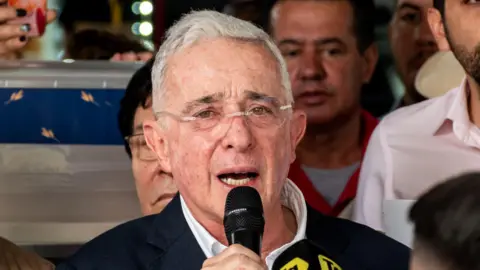In a historic ruling, former Colombian President Álvaro Uribe has been found guilty of witness tampering and fraud, making him the first ex-president in Colombia to be convicted of a crime. This significant verdict was handed down by a court located in Bogotá, the capital city of Colombia. The 73-year-old Uribe, who served as the country’s leader from 2002 until 2010, now faces the possibility of a lengthy prison sentence. Each charge against him carries a potential consequence of up to 12 years behind bars. The conviction arises from allegations that Uribe attempted to bribe witnesses in a separate investigation probing his alleged ties to right-wing paramilitary groups, which have been responsible for numerous human rights abuses throughout Colombia’s tumultuous history.
Uribe has always maintained his innocence, and he is expected to appeal the verdict. His efforts in office were primarily characterized by a fierce military offensive against the Revolutionary Armed Forces of Colombia (FARC), a leftist guerrilla group that has plagued the nation for decades. Despite the accusations against him, Uribe has steadfastly denied any connections to the paramilitary factions, which emerged in Colombia during the 1980s in a supposed effort to combat poverty and leftist insurgency.
The trial leading to Uribe’s conviction saw testimony from over 90 witnesses, making it not only a pivotal moment for the former president but also a crucial episode in Colombian politics. As the verdict was announced, Uribe reportedly shook his head in disbelief, reflecting profound disappointment at the judgment. In response to the outcome and the judicial proceedings, U.S. Secretary of State Marco Rubio criticized the decision, claiming that the Colombian judiciary had been weaponized against Uribe. In a statement via social media platform X (formerly Twitter), Rubio contended that Uribe’s only crime was his unwavering dedication to defend Colombia, reflecting the polarized views that still exist about Uribe among his supporters and detractors alike.
The legal challenges for Uribe date back over a decade to 2012 when he first faced accusations. At that time, he articulated claims against left-wing senator Iván Cepeda, alleging that Cepeda was engaged in a conspiracy aimed at linking him falsely to paramilitary organizations. The Colombian Supreme Court, however, dismissed Uribe’s allegations against Cepeda, choosing instead to investigate Uribe for his supposed connections. This investigation ultimately led to Uribe being accused of contacting imprisoned former paramilitary fighters and trying to coerce them into denying any associations with such groups — a clear case of witness tampering.
Political perceptions of Álvaro Uribe remain deeply divided. During his presidency, he received substantial support from the United States for his hardline stance against guerrilla insurgency; however, critics argue that his administration fell short in addressing the systemic inequality and poverty that plague vast segments of the Colombian population. Following Uribe’s presidency, his successor signed a peace agreement with the FARC in 2016; nonetheless, violence persists in Colombia, often at the hands of disarmed guerrilla factions and other armed groups.
In summation, Uribe’s conviction marks a notable turning point in Colombian history and governance. It serves as a reminder of the lingering legal and political turmoil that surrounds former leaders in countries riddled by conflict and accusations of human rights violations. As Uribe prepares to appeal this verdict, the outcome of his case will undoubtedly have far-reaching repercussions for Colombia’s political landscape and judicial integrity. The public’s perception of justice, accountability, and governance continues to evolve as Colombia reconciles its turbulent past with a desire for progress and peace.












